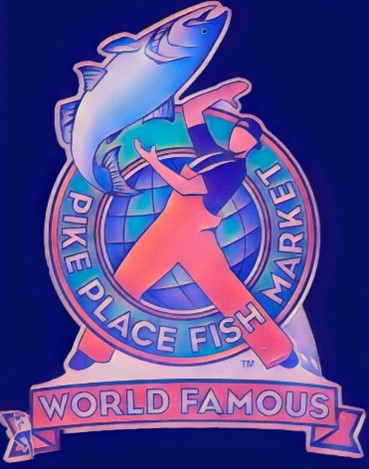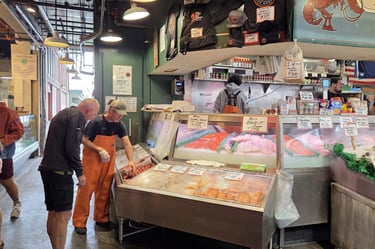What Flying Fish Taught Me About Leadership


Will you choose an attitude that inspires, make space for play, and recognise the people around you, or will you let busyness and distraction define how you lead?
For about 16 years, a copy of The FISH! Philosophy has sat on my bookshelf. More than just another business book gathering dust, it has been a quiet influence in the background of my work.
One of my former clients even built their company values around the philosophy. Every new employee was given a copy of the book on their first day. That simple gesture told them: “this is how we do things here.” Over the years, I have come back to those four principles time and time again, both for myself and for the leaders I have worked with.
When we planned our recent trip to Canada, we included a train journey from Vancouver to Seattle so I could finally visit Pike Place Fish Market, the birthplace of the FISH! Philosophy. After all those years, I got to stand in the crowd, watching the energy, the playfulness, and the famous flying fish, and it was everything I had imagined.
There is always a choice about the way you do your work, even if there is not a choice about the work itself.
Quote from Fish! Philosophy
choose your attitude.
PLAY
I'll start with the FISH! Philosophy Play. Standing in Pike Place, it was impossible not to feel it. The fishmongers weren’t just selling fish; they were performing, laughing, improvising with each other and with the crowd. Their work had all the seriousness of fresh produce and customer service, yet it was infused with fun and creativity. One child shouted “throw the fish!” and the fishmonger said “did you not see, I just threw one”, with a fun and engaging expression.
In leadership and in teams, Play doesn’t mean being silly or unprofessional. It means creating an environment where curiosity, humour, and energy can live alongside hard work. I have seen this principle transform workplaces. A leader who brings lightness to a tense situation, or who encourages their team to experiment with new approaches or creates space for innovation and trust to grow.
When I have introduced this idea to clients, the shift is almost immediate. Meetings feel less heavy. People contribute more freely. Problems are still solved, but with a sense of enjoyment rather than drudgery.
PLAY reminds us that work doesn’t have to drain us; it can also give us energy.
SUMMARY
I love the simplicity of the FISH! Philosophy. It reminds me that even in the most ordinary or unglamorous settings, we have the power to choose how we show up, how we connect with others, and how we bring energy into our day. It is easy to slip into autopilot, but these four principles nudge me back into being intentional about the experience I create for myself and those around me.
As a leader, the philosophy has been a practical anchor. I have seen over and over again that leadership doesn’t always require a complicated framework or a new management trend. Sometimes it comes down to presence, playfulness, recognition, and the courage to take responsibility for your attitude. When leaders live these principles, culture shifts. When they don’t, culture drifts.
That is why, after 16 years of keeping the book close and finally experiencing Pike Place for myself, the FISH! Philosophy still feels as fresh and alive as the day I first read it.
FOR YOUR REFLECTION
1. Which of the four principles speaks loudest to you right now: Play, Make Their Day, Be Present, or Choose Your Attitude? Why?
2. When was the last time you felt genuine playfulness at work? How did it change the energy in the room?
3. Who could you “make the day” for tomorrow with a small, thoughtful gesture?
4. How often do you catch yourself half-listening? What would it take to really be present in your next conversation?
5. What attitude have you been carrying recently, and is it the one you want others to catch from you?
Philosophy Origin
1998:
John Christensen developed the Fish! Philosophy, a business philosophy focused on creating happy workplaces.
1997:
Christensen visited the Pike Place Fish Market in Seattle, which inspired the philosophy.
MAKE THEIR DAY
The second principle is Make Their Day. At Pike Place, this looked like a fishmonger catching someone’s eye, cracking a joke, or handing a child a fish to “help” with the throw. These small moments weren’t about fish at all. They were about people leaving with a smile, a story, and a feeling of connection.
In leadership, the same principle applies. Make Their Day doesn’t mean grand gestures; it is the small, consistent acts that change the tone of a workplace. A genuine thank you. Noticing someone’s effort when they thought nobody was looking. Taking a moment to check in properly rather than rushing past.
I have watched leaders transform team dynamics by simply adopting this principle. It costs nothing to offer recognition or encouragement, but the impact is that people feel and hear it. When people feel seen and valued, their energy and loyalty shift. And often, it is those tiny moments that people remember years later, not the big speeches, but the genuine moments of recognition..
MAKING SOMEONE'S DAY Great leaders don’t overlook the small stuff; it's where trust is built.
BE PRESENT
(I sometimes say "be there, if you're there")
The third principle is Be There. At Pike Place, amidst all the noise and chaos, the fishmongers never lost sight of the person in front of them. Whether it was catching an order, locking eyes before tossing a salmon, or sharing a quick laugh, they were fully present in that moment. My husband stopped to talk about the produce and was invited to try some samples (always a winner for him!). I watched from the crowd as the exchange unfolded, and what struck me was how full of interest, curiosity, and genuine connection it felt.
In leadership, presence is one of the greatest gifts you can give. Being there means putting aside distractions, closing the laptop lid, and giving someone your undivided attention. It sounds simple, but it is increasingly rare.
I have seen how different a conversation feels when a leader is truly present. People open up more. Trust builds faster. Problems surface sooner and are solved more effectively. On the flip side, when presence is missing, people feel ignored, unheard, and undervalued.
BE PRESENT is not about time; it is about focus. Two minutes of real attention can sometimes mean more than an hour of half-listening.




CHOOSE YOUR ATTITUDE
The fourth principle is Choose Your Attitude. When you think about the environment of a fish market, it has a “special odour,” it is cold in winter, wet underfoot, and you are handling slippery fish all day. On paper, it is hardly an environment you would choose to work in. And yet, at Pike Place, every throw, every laugh, every interaction is a choice. The team chooses to bring energy, positivity, and connection to a job that could easily be overlooked.
In leadership, the same truth applies. We cannot always control the circumstances, the market shifts, the pressures, the unexpected problems, but we can control how we show up. The attitude we choose sets the tone for everyone around us.
I have seen leaders transform tense situations simply by choosing calm over panic, or decisive over deflection. And I have also seen how a negative attitude, unchecked, can spread through a team like wildfire. Choosing your attitude is both a personal discipline and a cultural responsibility.
YOUR ATTITUDE is contagious, so choose one worth catching!






